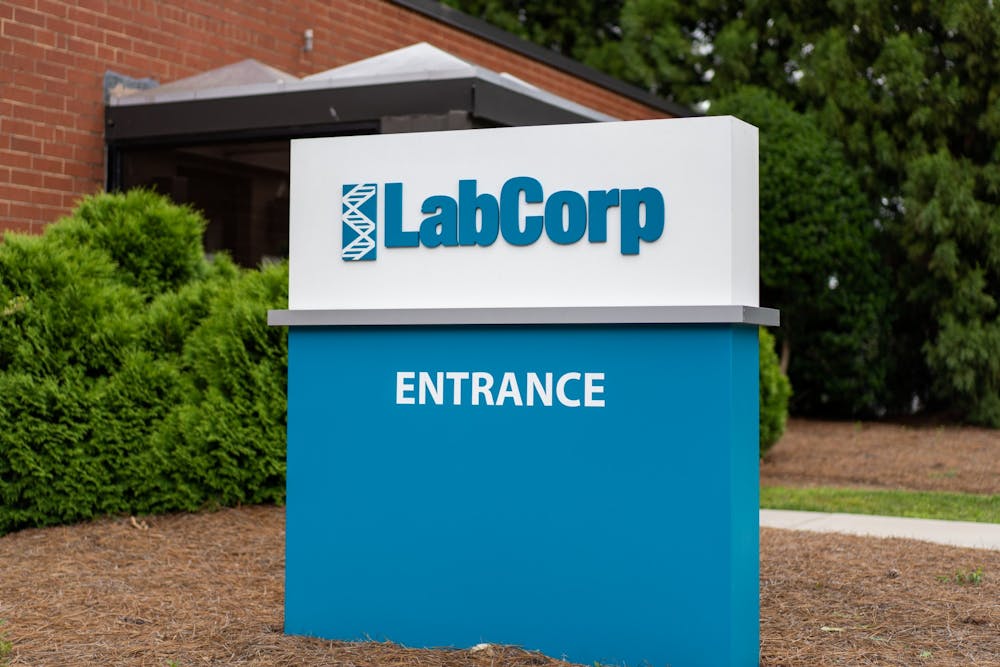Correction: Cynthia Snider, the medical director for infection prevention and hospital epidemiologist at Cone Health, was misspelled. Elon News Network regrets this error.
As coronavirus cases in North Carolina increase and Elon University releases its plan to reopen in the fall, Laboratory Corporation of America Holdings and Cone Health will continue to provide their services to the people of Elon and beyond.
Headquartered in Burlington, LabCorp became the first commercial laboratory in the United States to start providing polymerase chain reaction tests — tests for people currently infected with the coronavirus — on March 5. At the end of March, the corporation also began offering antibody testing.
With the help of LabCorp, Cone Health started providing PCR tests to their patients. With testing at three different locations in North Carolina — one located in Alamance County at the Alamance Regional Medical Center — health care workers at Cone Health collect nasal swabs from patients then shipped the samples to LabCorp for testing. After developing enough in-house capacity, Cone Health also began collecting more samples using different testing platforms.
According to Cynthia Snider, the medical director for infection prevention and hospital epidemiologist at Cone Health, they test about 500 patients a day.
“LabCorp easily provides like half of those tests for us. And so we use an algorithm to decide which tests that we sent off to LabCorp. And then also, we provide several community testing sites. And those tests get sent off to LabCorp as well, ”Snider said.
Snider said Cone Health is at an advantage when it comes to receiving test results with their healthcare facilities so close to the LabCorp headquarters,
“I think that benefit in our community of having LabCorp here is that we have recognized our relationship with them and we are able to send specimens multiple times a day and so we know that they are working around the clock, running the tests. And so the turnaround time, in a way, it's a little bit quicker for us” Snider said.
On a national scale, both companies have been participating in clinical trials to help find new treatments for the virus. In the fall, Cone Health hopes to start vaccine trials; supporting the efforts to find an immunization method.
Vice President of Corporate Communications for LabCorp Donald Von Hagen said there are two parts of LabCorp: lab testing for medical diagnosis and clinical studies.
“We support clinical trials, and we are putting a lot of effort right now into supporting clinical trials for COVID-19 for treatments and vaccines,” Hagen said. “We're doing work on a global basis for that. So we're kind of involved from top to bottom in this fight against COVID-19.”
As Elon University plans to reopen in the fall, they will be working directly with officials from Cone Health’s Alamance Regional Medical Center to adapt the university to maintain guidelines laid out by the CDC as well as maintain the health of students and staff.
“Plans are coming into place in terms of how to make sure that athletes coming back to campus are screened appropriately and also making recommendations of what to do in the event of a student starting having fevers and chills or cough,” Snider said.
Although there is no set plan as of now, LabCorp is currently discussing with the university ways in which they can help this upcoming fall.
“We stand ready to support them, whether that's through testing, or whether that's some other services we can provide like we can set up clinics to do temperature screening, we can have stations set up or on-campus or nearby to campus,” Hagen said.
As this virus progresses both companies will continue to provide testing to patients in Elon and at their other facilities. Having these corporations located so close to Elon means that residents of the local community can have easy access to these high performing healthcare services; LabCorp itself running as one of the largest clinical laboratory networks in the world.
“It would be hard to think of a location anywhere in the country that has less traveled time from where the specimens will be collected to the testing lab; you could pretty much walk from the campus to our lab in about 10 minutes. So that the benefit of that means is whatever we end up doing and how we're reimplemented, we'll be able to get the results back really quickly,” Hagen said. “The first laboratory to launch a test for COVID-19 is right there in Burlington, and many of the people — really all the people — who work in that lab, they live in the local community.”


